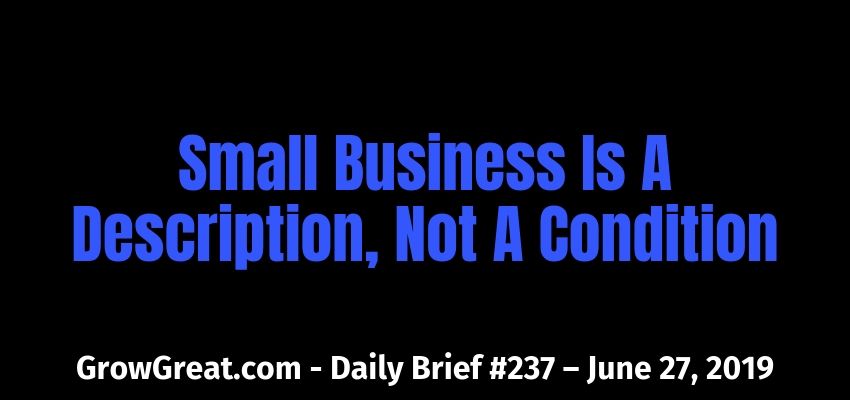Podcast: Play in new window | Download (Duration: 8:44 — 10.5MB)
Subscribe: Apple Podcasts | Spotify | RSS | More
Almost 30 years ago I had a conversation with an owner of a small business who was lamenting the smallness of his business (which wasn’t so small really since he was generating multi-millions in annual revenue).
“I’m not a neighborhood store, ” he complained. “They want to make me a neighborhood store.”
I reminded him that he decided to make himself a neighborhood store. Nobody did that to him. He hadn’t ventured beyond the neighborhood ever. His choice.
He was viewing his own condition as a small business as a condition imposed on him by others. Truth was, it was an accurate description of his business resulting from his own choices. He never wanted to expand beyond the neighborhood even though he had casually considered it a time or two. He liked being where he was until he felt others were looking down on him for being who he was.
I urged him to embrace being who he was…and if he wasn’t happy with being who he was, then do something about it. Change it. It’s within your power.
Almost 90% of businesses have fewer than 20 employees. Over 76% of them don’t have any employees. Most American businesses aren’t just small. They’re very small. In size. Either by revenue or headcount. (find some data here)
Small may describe the market impact of a company. Small may describe the employee count, annual sales or annual profits. But that doesn’t mean insignificant. It certainly doesn’t mean unimportant.
I’m very drawn to small business owners. And likely because of how my career started – working as a high school kid for a local stereo shop owner – I’m empathetic to the struggles and the opportunities of these owners. It doesn’t matter if they’re generating a few hundred thousand dollars annually or hundreds of millions. Add a zero. Add a few people. Scope and scale apply to problems and opportunities alike.
Small describes it. And it’s fine.
I like small cars. Small 4-cylinder cars that are quick and zippy. I can get in and out of traffic quickly because I can go fast quickly, I can turn quickly, and I can stop equally fast. The term I’ve used for decades to fuel companies – and to engage people more fully – is “highly maneuverable.” And it’s a quality that is mostly afforded to small business.
Highly Maneuverable
As a small business owner you can move faster. If something isn’t working, you can change it right now. You don’t need to assign a team of people to study it. You likely know the issues intimately because you’re close to the work, to the people doing the work and to the customers. So you’ve got a sense of what’s right and what’s wrong. So you can adapt and change.
And if your adaptation or change isn’t spot on, then you can do it again. Speed is your friend.
I often liken it to shooting at a target. The first shot taken quickly establishes how far off dead center you are. So you adjust your aim and take your second shot. It’s closer, but perhaps still not quite dead center. More adjustment and now a third shot. BINGO! Smack dab in the dead center of the target.
While bigger enterprises are researching, assessing, quantifying and whatever other examinations they need to feel confident enough to pull the trigger…you’re setting up your second and third shot. It begs the question, “Will your 3rd shot be more accurate than their 1st?”
OF COURSE.
There’s your advantage as a small business.
Bigger isn’t necessarily better. Or more powerful. Or more impactful.
You and your business matter. How do you put a measurement on the scope and scale on mattering? Ask your employees. Ask your customers. Ask your suppliers. The ripples in the water go on and on and on and on.
Sometimes I find myself working really hard to pump up a small business owner who just feels thankful for the success (many of them aren’t quite so small in revenue), but feels overwhelmed with all the resistance. And there’s always resistance no matter your size. Government. Industry constraints. Finding quality people. Technology costs. It just never ends…but such is the game (that we talked about yesterday). The game is great fun. The game of business.
Keep the trifecta of business building in mind.
- Getting new customers
- Serving existing customers better
- Not going crazy in the process
Your description as a small business is a terrific advantage that should give you increased confidence. It’s speed. It’s effectiveness. It’s intimacy with employees and customers. And from a practical viewpoint, it’s something else. It’s overhead. It’s the fuel you need to be extraordinary.
Big fish need much more food. Their daily dietary requirement is significantly bigger than small fish.
You can get by on less. This isn’t merely an advantage in bad times but in good. Don’t get fat and happy in these good times. Enjoy them. Plan for a downturn because there’s always one coming. And when it comes you can shift gears and blaze past the competition – likely the larger, more lumbering competition that now finds itself needing more fuel, but unable to find it.
Embrace your smallness. Embrace it for the strength is it. Lean heavily into the extraordinary performance you’re capable of because of your size. Focus on what you can do – and better. Don’t focus on what you can’t do. Don’t view your description as your condition. It’s not.
Be well. Do good. Grow great!
Randy
